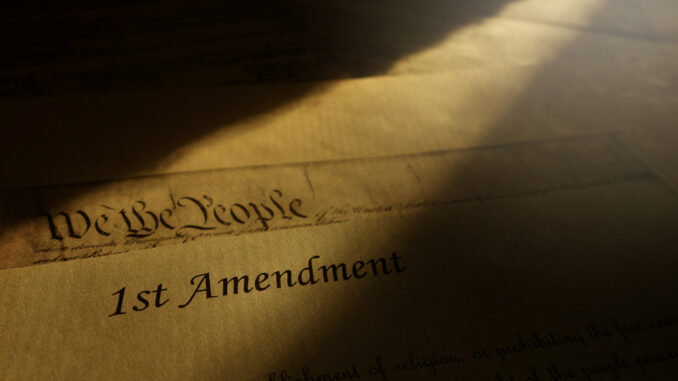
Previously Published in The Messenger
The assassination of Charlie Kirk is now hitting the inevitable phase of any massive tragedy or occurrence, the legislative end of things.
Attorney General Pam Bondi (R-FL) called for ramped up efforts, even “targeting”, of those proliferating “hate speech” about Charlie Kirk, his death, his family, and his supporters. She later walked back the comments to stipulate that threats of violence are not permitted under the First Amendment – correct – but the damage was already done.
Didn’t the conservative right fight against federal crackdowns on speech during the Biden Administration? Haven’t other countries’ free speech laws – or lack, thereof – such as the United Kingdom, been spawning conversations for the last few years?
Why, now, do we find ourselves where we started?
Let us be clear, we find the celebrations and snide apathy about Kirk’s murder utterly reprehensible, a standard we would hold for a person of any ideology who had been mercilessly and cruelly silenced. We also think that the temperature is hotter than it’s ever been in the modern era, perhaps, and we lament that many figures, including President Trump himself, aren’t speaking to an overwhelming tone of unity.
The value of fiat political currency still reigns supreme, apparently, and we think the tit-for-tat style of retaliation is only fanning the flames.
It’s why we understand why four Republican congressmen sided with Democrats to not censure Ilhan Omar (D, MN-05) over her nasty and incomprehensible comments about Kirk. At what point does the right begin promulgating the very cancel culture they’ve sworn to destroy?
However, we find ourselves at an interesting inflection point of which we think many must be reminded: freedom of speech does not mean freedom from consequences of said speech.
This proviso doesn’t apply to violence, nor anything that could be constituted as “shouting ‘fire’ in a crowded movie theatre.” All this means is that you’re free to say mostly anything you’d please, but it also means that you’re free to bear witness to responses. In a civilized society, this is understood implicitly, but both sides have grown tired, bored, and even agitated of listening to each other. So, it’s just easier to shut one side up after one election and vice versa the next.
This is why we don’t lament those who have been fired from their jobs because of the disgusting things they’ve said or posted online about Charlie Kirk. Yes, freedom of speech, but most forms of employment are at-will, meaning your employer can fire you at any time for almost any reason and you have virtually no recourse. To be fair, if an employee of The Messenger was found to be snarkily chastising the grieving widow of someone who was very callously and publicly assassinated – right, left, or center – we’d say, “good riddance.”
It’s one thing to espouse political views opposite from those of your employer, whether said employer’s views are public or not. That shouldn’t be grounds for any dismissal in its own right, but mocking an assassination, or a massive tragedy with gigantic societal implications, is a totally different ballpark. We don’t fault employers for not wanting that poor reflection, as most people are rightly shocked and appalled that our country has sunken to this level of tension only seen at least somewhat congruently since the onset of the Civil War.
“Too far” is a subjective term, but people have been getting fired or reprimanded for doing or saying stupid things while on company time for decades. We don’t think that the First Amendment’s provisions come into any different form of play when a company intends to represent its values of empathy and shock towards such a tragedy.
Saying controversial things warrants a reaction, but the more we feed into those statements and reactions, the more we escalate the tensions.
Our advice: pick your battles and move on. The First Amendment allows most speech without threat of prosecution, but it isn’t the trump card over every other freedom and right out there.
Sometimes, it’s worth it to just air the grievances and move on. In a world of petty politics, tit-for-tat is inevitable. We hope to see our federal officials be the bigger person for the sake of constitutional consistency.

